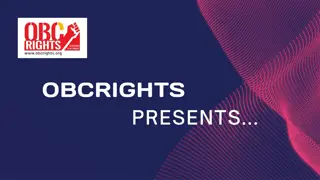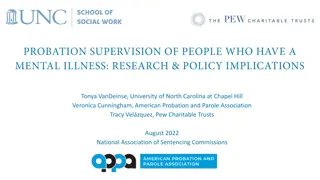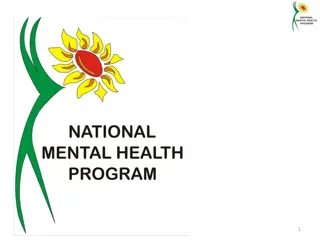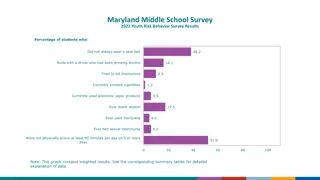Insights from Healthy Minds Survey: Mental Health Trends Among Students
The Healthy Minds Survey findings from October 2020 provide a detailed look at mental health trends among students. The survey covers respondent demographics, suicide ideation, general mental health concerns, utilization of counseling services, and more. Key findings include data on gender identity, race/ethnicity, suicide ideation rates, need for mental health help, sources of support during emotional distress, common diagnoses, medication usage, and counseling service utilization.
Uploaded on Oct 09, 2024 | 1 Views
Download Presentation

Please find below an Image/Link to download the presentation.
The content on the website is provided AS IS for your information and personal use only. It may not be sold, licensed, or shared on other websites without obtaining consent from the author.If you encounter any issues during the download, it is possible that the publisher has removed the file from their server.
You are allowed to download the files provided on this website for personal or commercial use, subject to the condition that they are used lawfully. All files are the property of their respective owners.
The content on the website is provided AS IS for your information and personal use only. It may not be sold, licensed, or shared on other websites without obtaining consent from the author.
E N D
Presentation Transcript
Healthy Minds Survey: Overview of Findings Survey Distributed October 2020
Survey Respondent Demographics
Survey Respondent Demographics Gender identity Female: 72.21% (317) Male: 24.15% (106) Genderqueer: 1.37% (6) Gender non-binary: 1.14% (5) Self-identify: 0.68% (3) Trans male: 0.23% (1) Race/Ethnicity White: 84.40% (384) African American: 7.91% (36) Asian: 3.3%(15) Hispanic: 2.2%(10) American Indian or Alaskan Native: 1.32% (6) Middle Eastern, Arabian: 0.44% (2) Average # of hours worked per week during the school year (paid employment only) Average: 20.73 Hours Maximum: 190 Hours Within the past 12 months, worried whether food would run out before getting money to buy more. Often true: 6.26% (27) Sometimes true: 19.95% (86) Never true: 73.78% (318)
Suicide Ideation In the past year Did you ever seriously think about attempting suicide? Yes: 16.26% (66) No: 83.74% (340) Did you plan to attempt suicide? Yes: 36.92% (24) No: 63.08% (41) Did you attempt suicide? Yes: 13.85% (9) No: 86.15% (56)
General Mental Health In the past 12 months, I needed help for emotional or mental health problems such as feeling sad, blue, anxious or nervous. Strongly Agree: 27.93% (112) Agree: 17.46% (70) Somewhat agree: 19.70% (79) Somewhat disagree: 5.24% (21) Disagree: 13.47% (54) Strongly Disagree: 16.21% (65) I currently need help for emotional or mental health problems such as feeling sad, blue, anxious or nervous. Strongly Agree: 26.82% (70) Agree: 24.9% (65) Somewhat Agree: 26.82% (70) Somewhat Disagree: 8.05% (21) Disagree: 10.73% (28) Strongly Disagree: 2.68% (7)
General Mental Health In case of serious emotional distress, students reach out to: Friends 24% (214) Family Member 23% (207) Significant other 20% (183) Professional Clinician 19% (168) Roommate 6% (51) No one 3% (27) Students professional diagnosis: Depression 21% (124) Anxiety: 24% (146) PTSD: 6% (36) Intellectual Disability: 5% (31) Percentage of students taking medication prescribed by their providers: 33% (140) Reason for taking medication: 75% for mental/emotional health (104) 12% for other health reasons (18) 10% for academic purpose (15)
Utilization of Counseling Services
Counseling Services Percentage of students receiving counseling or therapy in 12 months prior to survey: 0 sessions: 41.45% (76) 1-3 sessions: 18.03% (33) 4-6 sessions: 12.57% (23) 7-9 sessions: 9.84% (18) 10 or more sessions: 18.03% (33) Percentage of students receiving counseling or therapy at time of survey: Yes: 44.34% (47) No: 55.66% (59) Where students are accessing counseling or therapy: NKU Health, Counseling & Student Wellness: 21.63% (32) Provider in the local community (not on campus): 26.35% (39) Provider in another location (such as your student s hometown): 28.38% (42) Other: 24.33% (36)
Counseling Services Of the 32 students who reported receiving counseling or therapy at NKU Health, Counseling & Student Wellness in the last 12 months, they rated their level of satisfaction as follows: Convenient hours: Over 72% rated as very satisfied or satisfied Location: Over 77% rated as very satisfied or satisfied Quality of therapists/counselors: Over 61% rated as very satisfied or satisfied Respect for your privacy concerns: Over 80% rated as very satisfied or satisfied Ability to schedule appointments without long delays: Over 77% rated as very satisfied or satisfied
Counseling Services The following questions were asked of all students regarding their experience with counseling services at any point in their life: How helpful, overall, do you think therapy or counseling was or has been for your mental or emotional health? Very helpful: 32.79% (60) Helpful: 25.68% (47) Somewhat helpful: 27.87% (51) Not helpful: 13.66% (25)
Barriers to Accessing Services
Barriers to Accessing Services Access to Counseling center 10% (29) of students reported not knowing where to access counseling services. 8% (21) of students reported difficulty finding an available appointment time. Perception of Stigma 50% (203) of respondents agreed that people have a negative perception of those who receive mental health. Finances & Time 20% (53) of students reported financial reasons. 18% (47) reported not having enough time. Other Barriers 12% (33) of students reported not needing care 10% (29) of students prefer to rely on self and peers for help 7%(19) reported concern that people providing services won t understand them 2% (5)of students reported privacy concerns Lack of motivation, prefer in person therapy, concerns of homophobia, and fear of hospitalization were other qualitative responses reported by students.
Student Health Insurance Source of your current Health Insurance coverage: No Health Insurance coverage: 3.4% (14) Health Insurance coverage thru a parent or their employer: 61.7% (253) Health Insurance coverage thru employer or a spouse s employer: 19.2% (79) Medicaid: 8% (33) Uncertain if insured or where coverage is from: 5.1% (21) Do you know if your insurance plan has coverage for a visit to a mental health professional? Yes: 29.2% (110) I think it does, but not sure: 33% (124) I have no idea: 28.7% (108) I feel that my coverage for Mental Health Services is inadequate because: Co-pay is too expensive: 24% (17) Deductible is too expensive: 18% (13) Limit to number of services covered: 21.1% (15)
Sense of Belonging Students do not see themselves as a part of the campus community. 43% (185) Students expressed some degree of dissatisfaction with the overall experience at NKU 17% (73) Students feel that the campus environment has a negative impact on their mental health. 24% (103) Students somewhat to strongly disagree that the school actively works towards combating racism within the campus community. 18% (76)
Responses to CoVID-19 Questions How has your financial situation been affected by the CoVID-19 pandemic? "A lot more" or 'somewhat more" stressful: 60% (260) How supportive have the following groups been for you during the CoVID-19 pandemic? University Administration: 61% (233) "supportive" or "very supportive" Professors: 71% (272) "supportive" or "very supportive' How closely have you been following recommendations for hygiene practices? 96.6% (373) "very closely" or "somewhat closely" How closely have you been following recommendations for social/physical distancing? 91.1% (350) "very closely" or "somewhat closely"
Responses to CoVID-19 Questions Most trusted sources of information regarding the CoVID-19 pandemic? Public Health Agencies (CDC, WHO, State/local health depts.): 32.8% (272) State or local elected officials: 13% (108) National media outlets: 11.2% (93) Friends or family members: 11.2% (93) Officials from my university: 9.4% (78) At time that survey was completed by participants (October,2020), less than 5% of respondents had a confirmed case of CoVID-19. However: 53.3% (201) thought it was likely they would develop CoVID-19 29.5% (114) had a loved one, close family member or friend who had experienced CoVID-19 7% (27) had experienced a loss of a loved one due to CoVID-19 How has your access to mental health care been affected by the CoVID- 19 pandemic? Much more difficult or limited access: 10.75% (43) Somewhat more difficult or limited access: 19.50% (78) No significant change in access: 23.75% (95) Somewhat less difficult or limited access: 1.75% (7) Much less difficult or limited access: .75% (3) Don't know or not applicable (have not tried to access care): 43.50% (174)
Responses to CoVID-19 Questions Over the past two weeks*, on average, how much have you been concerned with the following? Students responded ''very concerned'' or ''extremely concerned to: Uncertainty about the future: 61.1% (235) Not being able to spend time with people you care about: 53.2% (204) People you care about contracting CoVID-19: 52.4% (201) People you care about dying from CoVID-19: 52.4 % (201) How long the CoVID-19 pandemic will last: 48.9% (188) Missing milestones at school (sports, performances, graduation): 41% (156) How many more people will become infected: 39.5% (152) * Respondents answered this question in October 2020. Since the CoVID-19 pandemic is a fluid situation, these responses would likely change according to personal circumstances at any given time.
Student Victimization
Student Victimization Over the past 12 months Were you kicked, slapped, punched or otherwise physically mistreated by another person? 7.16% (29) = Yes Were you called names, humiliated, judged, threatened, coerced or controlled by another person? 30.37% (123) = Yes Has anyone had unwanted sexual contact with you? 9.85% (40) = Yes
Student Bystander Behavior
Overall Student Bystander Attitudes We are a campus where we look out for one another. 42.22% (add number) of students agree or strongly agree 43.8% somewhat agree 5.54% of students somewhat disagree 8.44% of students disagree or strongly disagree I am responsible to help if a friend is struggling. 78.74% of students agree or strongly agree. 17.59% somewhat agree 2.10% somewhat disagree 1.57% disagree or strongly disagree I am responsible to help if a classmate is struggling. 49.61% agree or strongly agree 12.6% somewhat agree 4.73% disagree or somewhat disagree
Opportunities for Bystander Intervention In the past year, I have witnessed the following situations on my campus: Someone was drinking too much 11.89% (58) Someone was at risk of being sexually assaulted 4.71% (23) Someone was using hurtful language (bullying, sexist, racist, or homophobic comments) 14.55% (71) Someone was experiencing significant emotional distress or thoughts of suicide 11.48% (56) There was a physical altercation or fight 1.02% (5)
Bystander Attitudes I would intervene if I saw someone drinking too much 83.9% (318) somewhat to strongly agree I saw someone was at risk of being sexually assaulted 98.69% (375) somewhat to strongly agree I saw someone was using hurtful language (bullying, sexist, racist, or homophobic comments) 95% (361) somewhat to strongly agree Someone was experiencing significant emotional distress or thoughts of suicide 98.43% (374) somewhat to strongly agree There was a physical altercation or fight 77.95% (297) somewhat to strongly agree
Actual Bystander Behavior In the past year, when I witnessed the following situation Someone was drinking too much 17.54% (30) intervened 8.33% (10) did not intervene Someone was at risk of being sexually assaulted 8.77% (15) intervened 2.5% (3) did not intervene Someone was using hurtful language (bullying, sexist, racist, or homophobic comments) 22.81% (39) intervened 11.67% (14) did not intervene Someone was experiencing significant emotional distress or thoughts of suicide 26.9% (46) intervened 3.33% (4) did not intervene There was a physical altercation or fight 1.17% (2) intervened 4.17% (5) did not intervene Of students who intervened, 93.42% somewhat to strongly agreed they were able to make the situation better.
Barriers to Intervening I felt it was none of my business 19.05% (12) I didn t know what to do 17.46% (11) I felt it was unsafe 15.87% (10) I didn t feel confident 14.29% (9) I was afraid of embarrassing myself 7.94% (5) I assumed someone else would do something 6.35% (4) I was afraid I d get in trouble 6.35% (4) I was afraid my friends wouldn t support me 0%
Student Athletes
Responses to Student Athlete Questions Of the 31 NKU Student-athletes who completed the survey: 43.33% (13) reported they needed to feel lean in order to feel good about themselves. 0%reported violating NKU s drug/alcohol policy.























